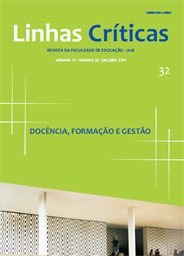Education and hope in teacher training: dialogues between Pedagogy and Theology
DOI:
https://doi.org/10.26512/lc.v17i32.3678Keywords:
Education, Hope, Teacher trainingAbstract
Education and the teaching profession face a crisis at the beginning of the XXI Century. From education, humanity expects the redemption of all its evils. Consequently, it also expects teachers to solve all the problems related to the complex task of educating new generations, who are born and raised in situations and realities marked, on the one hand, by voracious competition and, on the other, by emptiness of meaning. Therefore, this text highlights the importance of an interdisciplinary view encompassing pedagogy and other sciences, establishing a dialog between education and theology and presenting a reflection about the dimension of hope in teacher training. The meeting of pedagogy and theology can bring subsidies in the search for new meanings in this context.
Downloads
References
AHLERT, Alvori. La esperanza como eje en la formación docente: aportes de la teología de la esperanzade Jürgen Moltmann.Fundamentos en Humanidades, San Luis, v. 17, p. 71 ”“ 84, 2008.
______. A eticidade da educação:o discurso de uma práxis solidária/universal. 2. ed. Ijuí: Unijuí, 2003.(Coleção Fronteiras da Educação).
ANDREOLA, Balduino A.; RIBEIRO, Mário Bueno. Paulo Freire no Conselho Mundial de Igrejas em Genebra. Estudos Teológicos,v. 45, n. 2, p. 107-116, 2005.
BAUMAN, Zygmunt. Entrevista sobre educação. Desafios pedagógicos e modernidade líquida. Cadernos de Pesquisa, Campinas, v. 39, n. 137, p. 661-684, mai./ago. 2009.
BECK, Nestor L. J. Educar para a vida em sociedade: estudos em ciências da educação. Porto Alegre: EDIPUCRS, 1996.
BRAKEMEIR, Gottfried. Educação e construção de sentido. Lições ”“ Revista de Ensino e Pesquisa, São Leopoldo, n. 22, p. 23-26, jan./jul. 2009.
BOURDIEU, Pierre. A Escola conservadora: as desigualdades frente à escola e à cultura. In: NOGUEIRA,Maria Alice; CATANI, Afrânio. (Orgs) Escritos de educação.Petrópolis: Vozes, 1998.
CORTESÃO, Luiza. Ser professor: um ofício em extinção? 2. ed. São Paulo: Cortez; Instituto PauloFreire, 2006. (Coleção Prospectiva, 6)
DEMO, Pedro. Educar pela pesquisa.7. ed. Campinas: Autores Associados, 2005. (Coleção educação contemporânea)
ESTEVE, J. M. O mal-estar docente:a sala de aula e a saúde dos professores. São Paulo: EDUSC, 1999.
FREIRE, Paulo. Pedagogia da esperança:um reencontro com a pedagogia do oprimido. 5. ed. Rio deJaneiro: Paz e Terra, 1998.
______. Pedagogia da Indignação:cartas pedagógicas e outros escritos. São Paulo: Editora UNESP,2000.
______. In: FREIRE, Ana Maria Araújo. (Org.) Pedagogia da tolerância/Paulo Freire.São Paulo: EditoraUNESP, 2004.
FRIGOTO, Gaudêncio. Educação e crise do capitalismo real. São Paulo: Cortez, 1995.
GUTIÉRREZ, Gustavo. Teologia da libertação:perspectivas. 4. ed. Petrópolis: Vozes, 1983.
IMBERNÓN, Francisco. Formação docente e profissional: formar-se para a mudança e a incerteza. 4.ed. São Paulo: Cortez, 2004. (Coleção Questões da Nossa Época; v. 77)
MOLTMANN, Jürgen. Teologia da esperança.São Paulo: Herder, 1971.
POZZOLI, Maria Teresa. Transformar el conocimiento en la sociedad globalizada (Pensamiento Complejoy Transdisciplinariedad).
POLIS, Santiago, v. 5, n. 16, p. 163-192, 2007.
SÁ-CHAVES, Idália da Silva Carvalho. A construção do conhecimento pela análise reflexiva da práxis.Coimbra: Fundação Calouste Gulbenkian, 2002.
SANTOS, Milton. O professor como intelectual na sociedade contemporânea. ENCONTRO NACIONALDE DIDÁTICA E PRÁTICA DE ENSINO.9, 1998, Águas de Lindóia. Anais IX ENDIPE, v. 3, p. 11-28.
STRECK, Danilo Romeu. Correntes pedagógicas:aproximações com a teologia. Petrópolis: Vozes/CELADEC, 1994.
______. Dos saberes sobre el hacerse humano: Encuentros y desencuentros entre teologia y pedagogia.Caminos, Havana, n. 46, p. 2-10, out./dez. 2007.
Downloads
Published
How to Cite
Issue
Section
License
Copyright (c) 2016 Linhas Críticas

This work is licensed under a Creative Commons Attribution 4.0 International License.
Authors who publish in this journal agree to the following terms:
-Authors maintains the copyright and grants the journal the right of first publication, the work being simultaneously licensed under the Creative Commons Attribution License which allows the sharing of the work with recognition of the authorship of the work and initial publication in this journal.
- Authors are authorized to enter into additional contracts separately, for non-exclusive distribution of the version of the work published in this journal (eg publish in institutional repository or as a book chapter), with acknowledgment of authorship and initial publication in this journal.
-Authorers are allowed and encouraged to publish and distribute their work online (eg in institutional repositories or on their personal page) at any point before or during the editorial process, as this can generate productive changes as well as increase the impact and the citation of published work (See The Effect of Free Access).



